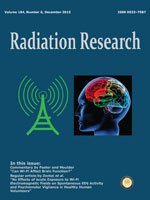Radiation-induced heart injury is one of the major side effects of radiotherapy for thoracic malignancies. Previous studies have shown that radiotherapy induced myocardial fibrosis and intensified myocardial remodeling. In this study, we investigated whether atorvastatin could inhibit radiation-induced heart fibrosis in Sprague-Dawley rats, which were randomly divided into six groups: control; radiation only; and four treatment groups receiving atorvastatin plus radiation (E1, E2, E3 and E4). All rats, except the control group, received local heart irradiation in 7 daily fractions of 3 Gy for a total of 21 Gy. Rats in groups E1 (10 mg/kg/day) and E2 (20 mg/kg/day) received atorvastatin and radiation treatment until week 12 after exposure. Rats in groups E3 (10 mg/kg/day) and E4 (20 mg/kg/day) received atorvastatin treatment from 3 months before irradiation to week 12 after irradiation. The expressions of TGF-β1, Smad2, Smad3, fibronectin, ROCK I and p-Akt in heart tissues were evaluated using real-time PCR or Western blot analyses. Atorvastatin significantly reduced the expression of TGF-β1, Smad3/P-Smad3, ROCK I and p-Akt in rats of the E1–E4 groups and in a dose-dependent manner. Fibronectin exhibited a similar pattern of expression changes. In addition, echocardiography showed that atorvastatin treatment can inhibit the increase of left ventricular end-diastolic dimension, left ventricular end-systolic diameter and left ventricular posterior wall thickness, and prevent the decrease of ejection fraction and fraction shortening in E1–E4 groups compared with the radiation only group. This study demonstrated that radiation exposure increased the expression of fibronectin in cardiac fibroblasts and induced cardiac fibrosis through activation of the TGF-β1/Smad3, RhoA/ROCK, and PI3K/AKT signaling pathways. Statins ameliorated radiation-induced cardiac fibrosis in Sprague-Dawley rats. Our results suggest that atorvastatin is effective for the treatment of radiation-induced cardiac fibrosis, especially with longer and higher dose atorvastatin treatment, as demonstrated in experimental group E4.
How to translate text using browser tools
18 November 2015
Atorvastatin Ameliorates Radiation-Induced Cardiac Fibrosis in Rats
KunYi Zhang,
XuYu He,
Yingling Zhou,
Lijuan Gao,
Zhengyu Qi,
Jiyan Chen,
Xiuren Gao
ACCESS THE FULL ARTICLE

Radiation Research
Vol. 184 • No. 6
December 2015
Vol. 184 • No. 6
December 2015




